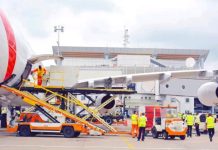The House of Representatives has advanced a bill to establish the African Aviation and Aerospace University (AAAU) in Abuja, marking a major step toward bridging Africa’s aviation skills gap and positioning Nigeria as a continental hub for aviation innovation, research, and training.
During a public hearing organized by the House Committee on Aviation Technology, lawmakers and key stakeholders from across the aviation industry expressed strong support for the proposed institution, describing it as transformative for Nigeria’s aviation and aerospace sectors.
Speaker of the House, Rt. Hon. Tajudeen Abbas, represented by Majority Leader Julius Ihonvbere, said the proposed university would address the pressing need for specialized skills and research in aviation and aerospace, critical to Nigeria’s economic growth. “By establishing this institution, the government will not only provide world-class education and training but also foster innovation, entrepreneurship, and job creation,” Abbas stated.
Committee Chairman Hon. Tajudeen Abisodun described the proposed university as a bold declaration of Nigeria’s readiness to lead in aviation technology and human capital development. “This university is not just for Nigeria—it is for Africa,” he said. “With Abuja as its home, it will serve as a beacon of progress for the continent.”
Representing the Minister of Aviation and Aerospace Development, Festus Keyamo, SAN, the ministry’s Permanent Secretary, Dr. Ibrahim Abubakar, said the university aligns with the federal government’s long-term vision to make Nigeria a global aviation training center. “The African Aviation and Aerospace University represents more than an educational institution—it is the future of aviation manpower development on the continent,” he said.
Abubakar explained that the idea for the university was first conceived in 2016 after a manpower audit revealed that Nigeria spent over ₦8 billion annually on foreign aviation training, with fewer than 15% of professionals under 40 holding postgraduate qualifications in aviation management, safety, or aerospace disciplines.
Chairman of the university’s Governing Council, Alhaji Bukar Goni Aji, noted that the Federal Government had already allocated 200 hectares of land along Bill Clinton Drive, Abuja, for the university’s permanent site, with several structures completed. “The passage of this Bill will strengthen the university’s global standing, attract funding, and ensure long-term sustainability,” Aji said.
The university’s Registrar, Dr. Mustapha Sheikh Abdullahi, highlighted that AAAU has received full accreditation from the National Universities Commission (NUC) and the Joint Admissions and Matriculation Board (JAMB). It currently offers seven accredited undergraduate and postgraduate programs and has trained over 300 professionals from agencies including the Nigerian Civil Aviation Authority (NCAA), Nigerian Airspace Management Agency (NAMA), and the Nigerian Safety Investigation Bureau (NSIB).
Abdullahi emphasized that legislative backing would empower the institution to expand globally and meet Africa’s growing demand for aviation professionals.
Supporting the Bill, Capt. Danjuma Ismail, Rector of the Nigerian College of Aviation Technology (NCAT), said AAAU would complement NCAT by focusing on advanced academic and research training. “Many aviation professionals lack access to postgraduate qualifications. The new university will provide that pathway,” he said.
Chief of Air Staff, Air Marshal Hasan Bala Abubakar, also endorsed the proposal, noting that Africa will need more than 70,000 new aviation professionals—including 23,000 pilots and 24,000 technicians—between 2025 and 2044, according to ICAO and Boeing forecasts. “The creation of AAAU is not only desirable; it is necessary. It will strengthen national security, drive innovation, and enhance Africa’s competitiveness in aerospace technology,” he stated.













